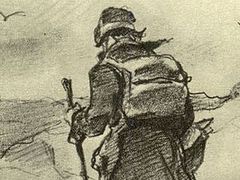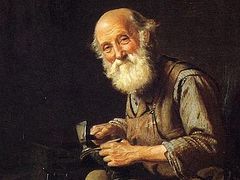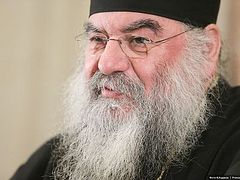There are many opportunities in the world for us to consider our lives in Christ. In America, the Martin Luther King Holiday gives us the chance to think about how our treatment of others is a moral issue which should be governed by the Gospel commandments of our Lord Jesus Christ. Loving strangers is part of our life in Christ, as Jesus teaches we will hear at the Judgment Day: “I was a stranger and you welcomed me“(Matthew 25:35; see also for example: Ephesians 2:19 or 3 John 5). Our prejudices and fears can help us identify the stranger whom we are to welcome. “Let brotherly love continue. Do not neglect to show hospitality to strangers, for thereby some have entertained angels unawares” (Hebrews 13:1-2).
One passage from the New Testament that we can consider when it comes to strangers, to our prejudices and to racist attitudes is found in the Epistle of James 2:1-13 –
My brothers and sisters, show no partiality as you hold the faith of our Lord Jesus Christ, the Lord of glory. For if a man with gold rings and in fine clothing comes into your assembly, and a poor man in shabby clothing also comes in, and you pay attention to the one who wears the fine clothing and say, “Have a seat here, please,” while you say to the poor man, “Stand there,” or, “Sit at my feet,” have you not made distinctions among yourselves, and become judges with evil thoughts?
If St. James says that it is evil which leads us to make distinctions between people because of the clothing they wear (whether we think them rich or poor), what would he say to us if we make distinctions based upon skin color or accents or facial features? I think he would clearly tell us such “distinctions” (i.e., prejudices, bigotry, racism, xenophobia) were based in evil thoughts, not in godliness. St James’ Epistle is for us Scripture – it has the authority of God’s Word. St. James is not saying that we won’t have feelings of phobias or prejudices. He tells us it is wrong to act on them and to treat others based on them. In love we have to overcome our own sinful thoughts.
Listen, my beloved brethren. Has not God chosen those who are poor in the world to be rich in faith and heirs of the kingdom which he has promised to those who love him? But you have dishonored the poor man. Is it not the rich who oppress you, is it not they who drag you into court? Is it not they who blaspheme that honorable name which was invoked over you?
St. James is immediately addressing the temptation of distinguishing between the poor and the rich and then treating them differently based on our sinful bias. However, there is a principle here that applies to many other ways in which we apply our prejudices or bigotry. We cater to the rich in our churches as we want their financial support, but St. James says it is the rich who are a threat to us Christians, not the poor. The rich are powerful and have the legal means to threaten us legally and in other ways.
We often fear the poor and want to keep them far from us, but St. James says it is the rich and powerful who are the real threat. For it is the rich and powerful who will tempt us away from adhering to the Gospel commands of love – by bribes or threats. Something to think about. We build walls to keep the poor out of our lives, but it is the rich and powerful who have the ability to pass laws which threaten our beliefs and moral practices and who have the power to have those laws enforced against us. Power is a greater threat to our religious freedom than poverty.
If you really fulfil the royal law, according to the scripture, “You shall love your neighbor as yourself,” you do well. But if you show partiality, you commit sin, and are convicted by the law as transgressors. For whoever keeps the whole law but fails in one point has become guilty of all of it. For he who said, “Do not commit adultery,” said also, “Do not kill.” If you do not commit adultery but do kill, you have become a transgressor of the law. So speak and so act as those who are to be judged under the law of liberty.
St James tells us if we commit the sin of making distinctions (of prejudice, bigotry, racism, xenophobia), we break the law of God and fall under condemnation for our sin. Note, St. James does not say “partiality” is listed in the 10 Commandments, but he says it is every bit as sinful to show partiality (prejudice, bigotry, racism, xenophobia) as it is to commit adultery or murder! If we think we can commit such sins as “partiality” or “making distinctions” because there is no direct scriptural commandment against them, just read the Epistle of James. There Scripture clearly teaches prejudice and racism and bigotry are every bit as sinful, evil and wrong as is murder and adultery. If we think prejudice and bigotry are somehow not as sinful or evil as murder and adultery, we need to look at the Epistle of James who will correct our thinking immediately.
For judgment is without mercy to one who has shown no mercy; yet mercy triumphs over judgment.
Mercy is the Gospel command we are to follow to rid our hearts of the sins of prejudice, partiality, racism, making distinctions, bigotry or xenophobia.
Mercy triumphs over justice and judgment. That is why in the Orthodox Church we constantly pray, “Lord, have mercy!” We are not constantly saying, “God be just and judge us.” We need God’s mercy and to receive it, we need to show mercy to others.
“Be merciful, even as your Father is merciful.
Judge not, and you will not be judged; condemn not, and you will not be condemned; forgive, and you will be forgiven; give, and it will be given to you; good measure, pressed down, shaken together, running over, will be put into your lap. For the measure you give will be the measure you get back.” (Luke 6:36-38)





Meanwhile Orthodoxy really does have a virtue based ethic. Jesus really does tell us to let our works shine before men. St. Paul really does teach us to speak the truth in love. If you have a hang-up with the signalling of virtue then I really question what you are doing in the Orthodox Church.
Still, I find it encouraging that these edgelords are unhappy that a priest teaches the Faith so clearly. Sooner or later they will have to choose between either their politics or Orthodoxy.
Look at the book:
1. Jesus shows partiality and prejudice for the children of Israel, He says: "I was sent only to the lost sheep of the children of Israel" (Matthew 15:24). He calls non-Jews "dogs".
2. In John 18:28 even walking into a governor's room would defile the Apostles! Again highly partial.
3. "We build walls to keep the poor out of our lives". Yet... there is a wall around Heaven (Revelations 21).
Why would Jehovah have a wall around Heaven? Presumably not to keep the poor out. Heaven's Wall is made of jasper which surrounds the holy city made of gold as clear as glass.
Can you imagine the Church calling into question the faith of their African flocks who wish to expel their imperial invaders during the Age of Colonialism? No, in fact in the Ethiopian Coptic Church helped thwart Portuguese and Italian conquests. The Ethiopian Coptic Church was the reason Ethiopia was the only independent country in Africa by the Twentieth Century.
We all know this article is finger wagging at White People and virtue signalling. This is symptomatic of the Church's cowardice in this matter.
All the people I mentioned attending Liturgy previously were Orthodox Christians, some being converts. I certainly do not promote ecumenism. There is only one God with one bride, the Orthodox Church. I am assuming that you are aware that anyone can become Orthodox by conversion?